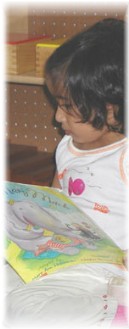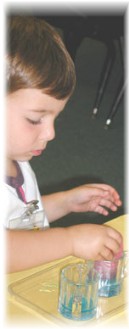Montessori Method - Little Wonders Montessori
Main menu:
Montessori Method
The History of Montessori
Inspired by Dr. Maria Montessori and her novel work, Helen Keller wrote that "Children will educate themselves under the right conditions. They require guidance and sympathy far more than instruction."
Based on her observations of young children in Italy during the early twentieth century, Dr. Montessori developed a child-
The Montessori Approach
The Montessori approach to education succeeds because it draws its principles from a child's natural development. That is to say, preschool-
Montessori classrooms provide a planned environment where children are free to respond to their natural drive to work and learn. Each child's innate love of learning is encouraged as he or she is given the opportunity to engage in spontaneous activities under the guidance of trained adults. Among many other qualities, Montessori-
The Montessori Teacher
The role of a Montessori teacher is that of a guide and observer whose ultimate goal is to intervene less and less as the child develops. The teacher builds an atmosphere of calm, order and intellectual curiosity in the classroom, and promotes self-
Primary Period (3-
Children in the primary program possess what Dr. Montessori called the absorbent mind, the ability to absorb all aspects of their culture and environment without effort or fatigue. During this period of a child's self-
Practical Life
Practical Life exercises instill a commitment to caring for one's self, for others and for the environment. Activities include many of the tasks children see as part of the daily routine in their homes, such as preparing food, washing dishes, saying "please" and "thank you" and asking to be excused from the table. Through these tasks, children develop muscular coordination and a sense of social responsibility.
Sensorial
Sensorial materials aid children in building cognitive skills and learning to classify impressions by touching, seeing, smelling, tasting, listening and generally exploring the physical properties of their environment.
Language
Language development is vital to human development. The Montessori environment is rich in oral language opportunities, allowing children to experience conversations, stories and poetry. Sandpaper letters, for example, help children link sounds and symbols effortlessly, encouraging the development of written expression and reading skills. Then, to further reading development, children are exposed to the study of grammar.
Mathematics
Math-
Extensions
Geography, Biology, Botany, Zoology, Art and Music are presented as extensions of the sensorial and language activities. Children learn about people and cultures in other countries with an attitude or respect and admiration; through familiarity, children come to feel connected to the global human family. Lessons and experiences with nature inspire a reverence for all life. And the comprehensive art and music programs let children enjoy a variety of creative activities, as well as gain knowledge of the great masters.


